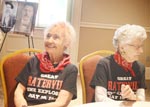For safekeeping; for history

Louise Nelson, left, and her sister, Marie Morts, chat with friends and well-wishers before the official transfer of their grandfather’s cap lamp
In fact, it’s surprising how small this item is when you first look at it.
For as small as this “item” is, it holds the weight of generations; it houses the burden of family tradition and family expectations and family hope.
And, daresay, family destiny.
It is a coal miner’s cap lamp, an item so vital to miners in the early 20th century that the responsibility of filling this vital part of a coal miner’s existence was not left to the miner.
At least, not in David Dezern’s case.
His wife, his love, took that vital responsibility on herself … “Every morning she made sure his cap light was filled with oil because that’s what he depended on for light in the coal mines,” Coal Creek Watershed Foundation Founder Barry Thacker told a packed room at the East Tennessee History Center in Knoxville Friday morning.
Dezern’s cap lamp, his strenuous hold on light while in the bowels of the East Tennessee coal rich earth, was one of the reasons people came together on a Friday morning in downtown Knoxville.
Dezern was one of five brothers who lost their lives on the morning of May 19, 1902, leaving behind a wife, Lula, and daughter, Eva.
Eva would, in time, have a daughter of her own — Louise Nelson.
On Friday Louise and her sister, Marie Morts of Willford, Ill., donated that cap lamp to the museum.
There’s an object no bigger than teacup — maybe smaller than a teacup.
And for all of her life — her 97-years of life — Louise Nelson remembers reaching out and touching this object every time she walked by it.
This small item, this cap lamp, became a window to the past for Louise and Marie — it was their connection to their grandfather and to their heritage.
“We want to keep this precious light … In the light. We are keeping it safe here,” Nelson said when presenting the keepsake.
“Powell Harmon’s watch is in Andy Woods’ hands.”
For the rescuers at the Fraterville Mine disaster finding the bodies of 20 other miners was not the end of the attempt to rescue their brothers.
Once the bodies were found it became their responsibility — their moral obligation — to recover the personal belongings of the deceased as a way to help comfort the grieving families.
They did this knowing the deed would be paid in turn if they were ever trapped under he earth.
One of the items recovered from Fraterville was a farewell letter from Jacob Vowell. In that letter was the whereabouts of fellow miner Powell Harmon’s watch.
Harmon’s great-granddaughter, Barb Titus, donated the watch to the East Tennessee History Center for “safekeeping” as well.
You may call it fate. Or destiny.
Or you may call it the bond that coal miners and the family of coal miners share because they know and understand the life and the hazards that life holds.
The donation of Powell Harmon’s watch holds so many intangibles — so many things strung together to make it such a heart wrenching story, that it sounds like a movie script.
If Powell Harmon had not written his own farewell letter while trapped beneath the earth in the Fraterville Mine;
If Powell Harmon had not instructed his sons to never mine coal;
If Condy Harmon, the 15-year-old son of Powell Harmon, had not defied his father’s words — because after his father’s death Condy Harmon was torn between his father’s dying wishes and being in a position to help his family;
If Condy Harmon hadn’t worked the Cross Mountain Mine, where in 1911 he lost his life in the Cross Mountain Mine explosion;
If Barb Titus, whose bloodlines begin with the Harmons, had not attended a memorial for those who were lost in the Cross Mountain Mine disaster;
If Barb Titus were a better driver;
The last “if” may not be a fact, but it was at the Cross Mountain Mine memorial that Titus found her car in a ditch.
So … If one of East Tennessee’s premier historians and writer/storytellers had not been at the memorial as well, helping Barb Titus, a resident of California, get her vehicle unstuck and striking up a conversation and friendship …
“Fred Brown may be the one responsible for the donation of the watch,” Thacker half-joked with Friday’s gathering.
But Thacker wasn’t joking when he pointed out that the descendants of Powell and Condy Harmon took Powell’s last instructions to heart and honored his memory by …
“I’ve never seen so many Phds in one family,” Thacker said. “Doctors, lawyers, engineers … They honor Powell Harmon’s last wish.”
Some may wonder about the power, the mystique of history. Why does history fascinate us so?
You could ask Danny Gaylor, the great-grandson of Jacob Vowell.
He read Vowell’s letter Friday morning, stopping several times to control his emotions, almost failing when he read, “Ellen, I want you to live right and come to Heaven. Raise the children the best you can.”
Or ask Louise Nelson why she always touched the cap lamp of a grandfather she never knew. “I touched the lamp to touch the past,” she explained.
Or you could ask Barry Thacker, who asked the same question: Why does history fascinate us?
“It’s not the disaster so much, as the people who rebuild after the ashes,” he said.
Or you could ask the students of Briceville Elementary School who know where they come from and are proud of that heritage — the 40 or so students who sat quietly during Friday mornings presentations, almost as if awestruck.
The same students who toured the museum with a quiet reverence.
Ask any of them the importance of history.

